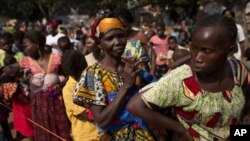The medical aid group Doctors Without Borders is reducing its operations in Central African Republic for one week. The move is to protest the recent killings of 16 civilians, including three staffers, at a northern hospital.
The civilians were killed on April 26th, during an armed robbery of the hospital in Boguila. The group, also known by its French acronym MSF, has since evacuated its remaining personnel from the area.
Stefano Argenziano, MSF Head of Mission in CAR, said, “It has been an act of extreme violence unto MSF and unto the local population. And a week later, we have decided to reduce, temporarily reduce, throughout the country in about 15 locations all our medical activities to only life saving services.”
Since December 2012, MSF has been the victim of 115 security incidents, including 31 armed robberies. It has repeatedly complained about the insecurity, including the attack in Boguila, which it described as the “most extreme and tragic of the past year.”
“Following the massacre in Boguila, there’s no official reaction nor condemnation from the government of Central African Republic nor from the different armed groups operating in CAR, in the Central African Republic. And we find this unacceptable,” he said.
Argenziano added that there was no mistaking the 115 bed hospital for anything but a medical facility.
“The hospital is clearly identified as an MSF facility, and so were the staff, which got killed during the attack. One of the most outrageous elements of the tragedy is the total lack of respect for a medical facility, for a hospital – a place where not only they could receive medical care, but also receive a certain degree of protection.”
The MSF head of mission said it’s not clear when the hospital in Boguila might reopen. The group is negotiating with all parties involved in the CAR violence about ensuring the safety of its personnel. Following those talks, a decision will be made on whether to restore all of its medical programs in the country to full operation.
Doctors Without Borders is calling on the international community to do more to protect the civilian population. The group has been working in the country since 1997 with more than 300 international staff members and more than 2,000 CAR national employees.
Violence in CAR grew dramatically worse last December. That’s when Christian militias, known as anti-balaka, formed and launched revenge attacks against mostly Muslim Seleka rebels. Since then, most of the Muslim population in Bangui has been relocated to safer locations. Civilians are the prime targets for both groups. The transitional government has not been able to stem the killings.
The civilians were killed on April 26th, during an armed robbery of the hospital in Boguila. The group, also known by its French acronym MSF, has since evacuated its remaining personnel from the area.
Stefano Argenziano, MSF Head of Mission in CAR, said, “It has been an act of extreme violence unto MSF and unto the local population. And a week later, we have decided to reduce, temporarily reduce, throughout the country in about 15 locations all our medical activities to only life saving services.”
Since December 2012, MSF has been the victim of 115 security incidents, including 31 armed robberies. It has repeatedly complained about the insecurity, including the attack in Boguila, which it described as the “most extreme and tragic of the past year.”
“Following the massacre in Boguila, there’s no official reaction nor condemnation from the government of Central African Republic nor from the different armed groups operating in CAR, in the Central African Republic. And we find this unacceptable,” he said.
Argenziano added that there was no mistaking the 115 bed hospital for anything but a medical facility.
“The hospital is clearly identified as an MSF facility, and so were the staff, which got killed during the attack. One of the most outrageous elements of the tragedy is the total lack of respect for a medical facility, for a hospital – a place where not only they could receive medical care, but also receive a certain degree of protection.”
The MSF head of mission said it’s not clear when the hospital in Boguila might reopen. The group is negotiating with all parties involved in the CAR violence about ensuring the safety of its personnel. Following those talks, a decision will be made on whether to restore all of its medical programs in the country to full operation.
Doctors Without Borders is calling on the international community to do more to protect the civilian population. The group has been working in the country since 1997 with more than 300 international staff members and more than 2,000 CAR national employees.
Violence in CAR grew dramatically worse last December. That’s when Christian militias, known as anti-balaka, formed and launched revenge attacks against mostly Muslim Seleka rebels. Since then, most of the Muslim population in Bangui has been relocated to safer locations. Civilians are the prime targets for both groups. The transitional government has not been able to stem the killings.




